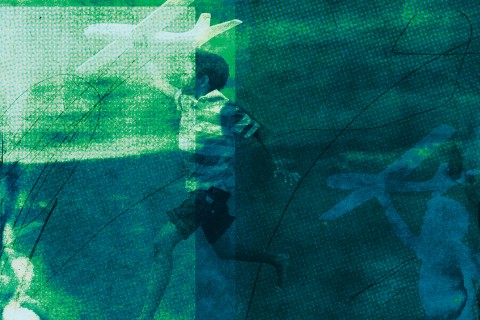The Zimmerman verdict and the desire to escape
When I heard the words “not guilty” Saturday night, I felt a variety of emotions. Those emotions ranged from initial confusion and disbelief to anger, and were followed by intense sadness and grief. I felt a renewed sense of loss for the Martin family—only this time, that sense of loss was compounded by frustration over the injustices they’re enduring at the hands of our legal system. In my despair, I closed my eyes and wished that I could escape the system—the social system, the class system, the racial system and the legal system—that we’ve built here in America.
While sitting there with my eyes closed, I remembered that the desire for escape—the longing for a place in the world where oppressive forces have been defeated, where the “least of these” have been vindicated and where evil is merely a memory—is a continual theme in scripture. I thought of how the search for some utopian place can be found early in the Hebrew Bible within the story of a people who journeyed for decades with hope of reaching a “promised land” rich with milk and honey. It’s found in the cries of those who desperately sought to escape exile because they were in a land where they were too depressed and oppressed to sing the songs of their home country. It is even found in the cautionary parables of Jesus—words that often paint a picture of a day when God will break into history and right the wrongs of the world.
This desire for escape, vindication and the intervention of God is also central to modern Christian theology. Most of the churches that I know adhere to some form of the Apostles’ Creed, which offers the claim that Jesus will someday “come again to judge the living and the dead.” A common belief spans across denominational identities and philosophical leanings: that at some point, “God’s people” will be removed (or “raptured”) from their existence in the world so that God can judge and ultimately deal with “wicked” people, and that at that time, those who have suffered oppression and/or persecution will finally witness God’s justice. This time of intervention—the “end times,” if you will—is understood as the time in history when God will finally balance the scales…a time for which many Christians wait with anticipation.
My personal theology has changed in recent years. As I wrote in my personal creed, I no longer hold traditional views about the end times. I don’t look for Jesus to return to our stratosphere on a white horse, wielding a sword in his mouth and sporting a tattooed thigh. Despite the shift in my personal beliefs, I do understand the desire for judgment, escape and vindication. I understand it in a deep place within my soul, and I understood it in a very real way Saturday night. I understood it as my friends and family members took to their social media accounts to declare that the American justice system does not have the “final say” and that God will judge Zimmerman “in the end.” I understood the complex nature of that belief in the context of its historical and theological roots, and I knew how this theology could remain sustainable throughout history…a history that has always featured an oppressive force and a victim.
As I sat on the floor in front of the television set with my eyes closed, listening to the jurors’ individual affirmations of their “not guilty” votes, I wished with every fiber of my being for the intervention of some loophole in the legal system, of the judge on television…or even of God. I wished for an intervention that would right the wrongs of my society and the suffering experienced in the rest of the world.
In that moment, I understood the desire to escape. But I reminded myself of my responsibility to remain as present as possible. I understood the desire for God’s intervention but also understood that it is my responsibility to intervene constructively. I reminded myself that the intervention of God requires the cooperation of humans…I remembered that the tools for changing the world have been entrusted to me.
I fought the urge to escape our society and the urge to wait patiently for divine intervention. And then I prayed for clarity on what I might do to help change the world.
Originally posted at Lewis's blog




